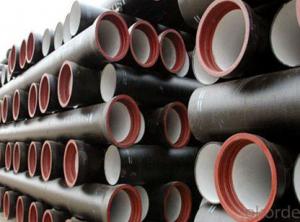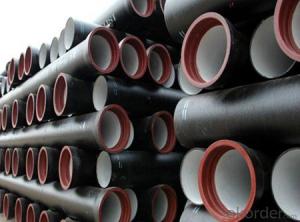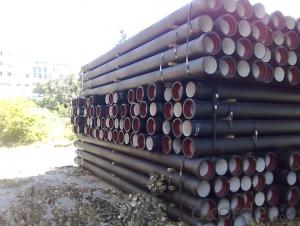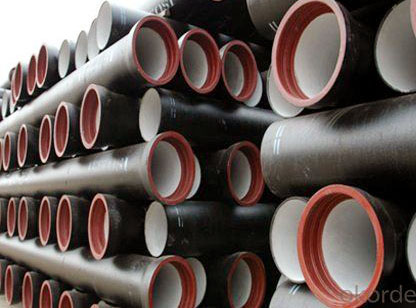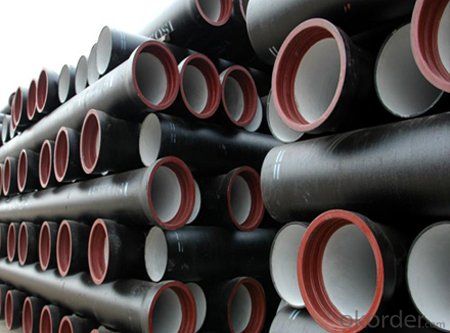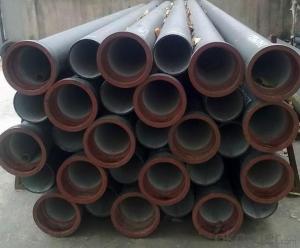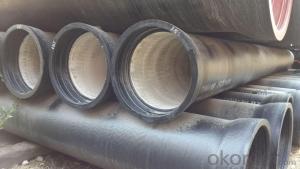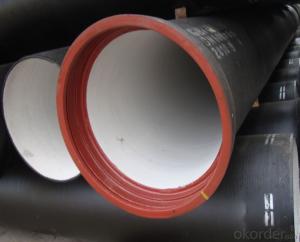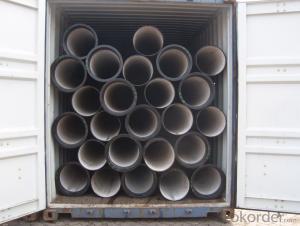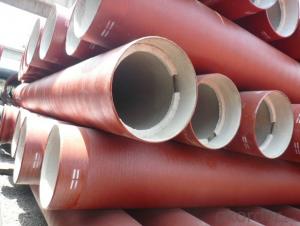New Ductile Iron Pipes of China DN200 EN598
- Loading Port:
- China main port
- Payment Terms:
- TT or LC
- Min Order Qty:
- 24 m.t.
- Supply Capability:
- 300000 m.t./month
OKorder Service Pledge
OKorder Financial Service
You Might Also Like
1. Ductile Iron Pipe Description :
2) Pipe ends: Spigot and socket ends, with 100% SBR rubber gaskets accoding to ISO4633
3) we can do third party inspection according to customer's request.
4) Our products have been sold to many international market, such as Middle East and South East Asia and Africa.
2. Main Features of the Ductile Iron Pipe:
Material: Ductile iron grade 500-7/ 450-10 in accordance with ISO1083
Test: In accordance with ISO 2531 / EN 545 / EN598 and 100% water pressure test
Rubber: NBR, SBR, EPDM according to ISO4633 / EN681.1
Note: The gaskets, bolts & nuts are supplied respectively as your special requirement
Standard: ISO 2531, EN545, EN598, ANSI, AWWA
Certificate: ISO9001, ISO14001, SGS, NSF, WRAS
Length: 6m or cut into 5.6m, 5.7m, 5.8m
Internal Lining: Cement, conform to ISO4179
3. Ductile Iron Pipe Images:
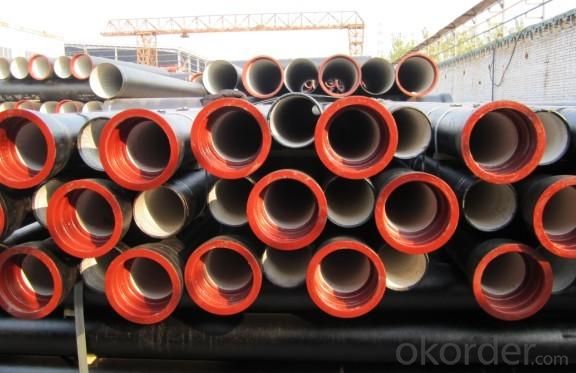
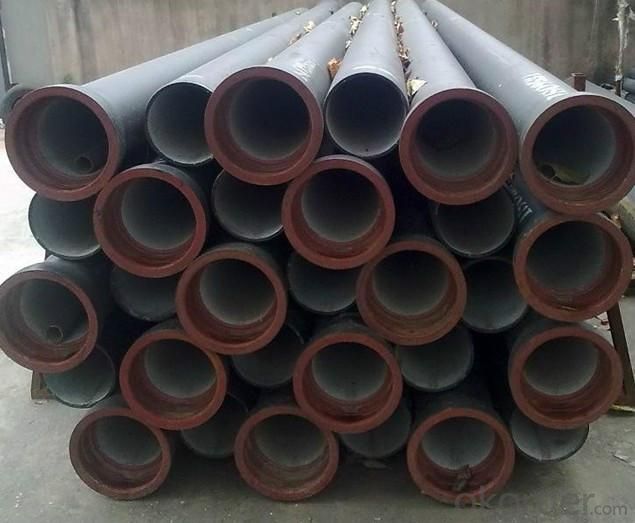
4. Ductile Iron Pipe Specification
Shape: Round
Hardness: 230
Pipe Wall Thickness: standerd
Pull Strength: 420
Yield (≥ MPa): 300
Material: Ductile Iron
water ductile iron pipe: SO2531 / EN545 DI pipe
Additional Services: Internal Coating
Packaging: packed in bag, plastic bag, steel strip, steel wire,double wire, iron box, wooden box, tarpaulin, plastic sheeting
Test: X-ray, UT, magnetic particle,inspection,hydrostatic test.
Processing service: Beveling, Threading, Slotting, Cut-to length, Bends, Quench and Temper, Fabrication, Double-jointing and On-site assistance
5.FAQ:
We have organized several common questions for our clients,may help you sincerely:
1.Q: Why would you choose ductile iron pipe rather than other pipe materials?
A:The reasons are obvious for that not only ductile iron pipe possesses the inherent strength and flexibility of ductile iron, combined with proven corrosion protection systems, but also the cost savings can be achieved from design to installation and commissioning.
2.Q:Why can you guarantee the inner of pipes can’t be corroded?
A: High alumina cement mortar lining and sulphate-resistant cement mortar lining. These two special linings are applicable to inner anti-corrosion for sewage pipes, improving resistance to erosion of the sewage components.
- Q: How much water seepage is allowed in the water pressure test for water hose DN300?
- Test method: metal composite pipe and water pipe system 10min observed in the test pressure, the pressure drop should be no more than 0.02MPa, and then reduced to working pressure check should be no leakage of plastic pipe; water supply system should be in the test pressure regulator 1H, pressure drop shall not exceed 0.05MPa, then stabilized at 1.15 times the working pressure of the state under 2h, the pressure drop shall not exceed 0.03MPa, and check each connection must not leak.
- Q: Are ductile iron pipes suitable for gravity sewer systems?
- Indeed, gravity sewer systems find suitability in the utilization of ductile iron pipes. Numerous properties possessed by ductile iron pipes render them highly compatible with this specific application. To commence, the high tensile strength of ductile iron pipes allows them to endure the weight exerted by the soil and other burdens imposed on them within a gravity sewer system. Consequently, these pipes can effectively resist deformation and maintain their structural integrity over an extended period. Moreover, the exceptional corrosion resistance exhibited by ductile iron pipes proves to be of utmost importance in sewer systems, which are frequently exposed to severe and corrosive surroundings. In this regard, the corrosion resistance of ductile iron pipes guarantees their long-term durability, thereby minimizing the necessity for maintenance and repairs. Additionally, the presence of a smooth internal surface in ductile iron pipes permits the efficient flow of wastewater within gravity sewer systems. A smooth surface reduces friction and prevents the accumulation of debris and sediment, thereby diminishing the likelihood of blockages and enhancing the overall performance of the system. Furthermore, the high resistance of ductile iron pipes to external forces, such as ground movements or heavy traffic, renders them highly dependable for gravity sewer systems where the pipes may encounter various external stresses. In conclusion, the amalgamation of properties encompassing high tensile strength, corrosion resistance, smooth internal surface, and resistance to external forces establishes ductile iron pipes as a suitable and reliable choice for gravity sewer systems.
- Q: Can ductile iron pipes be used for hydropower projects?
- Yes, ductile iron pipes can be used for hydropower projects. Ductile iron pipes are known for their durability, strength, and resistance to corrosion, which makes them suitable for various applications, including hydropower projects. They can handle high-pressure water flow, making them ideal for conveying water to turbines or other power generation equipment. Additionally, ductile iron pipes have a long lifespan, which reduces maintenance and replacement costs over time. Therefore, using ductile iron pipes in hydropower projects can contribute to the overall efficiency and reliability of the system.
- Q: Are ductile iron pipes suitable for use in mining tailings pipelines?
- Yes, ductile iron pipes are suitable for use in mining tailings pipelines. Ductile iron pipes have excellent strength and durability, making them capable of withstanding the harsh and abrasive conditions often found in mining operations. They have high tensile strength, which allows them to handle the pressure and weight of the tailings material. Additionally, ductile iron pipes have good resistance to corrosion, which is important in a mining environment where the tailings may contain chemicals or other substances that can be corrosive. Furthermore, ductile iron pipes are known for their ease of installation and maintenance, which can be advantageous in mining operations where time is crucial. Overall, ductile iron pipes are a reliable and cost-effective choice for mining tailings pipelines.
- Q: What is the use of ductile iron?
- Manufacturer of automotive diesel engines are starting from the prolong engine life, particularly cautious about expressing selection of crankshaft material, when the isothermal bainitic ductile iron and high strength in order to increase the power to weight ratio, expand the turbocharger use influence design according to the material, equipped with exhaust turbocharger tube the temperature is increased to 500 to 70. C, in this condition, the oxidation and creep strength become important. Ductile iron, with good properties, is being used instead of gray iron for the exhaust pipe and will further use silicon aluminum alloy ductile iron as the temperature increases.
- Q: What are the different types of joints used in ductile iron pipes?
- Ductile iron pipes commonly utilize various types of joints to achieve secure and leak-proof connections between pipe sections. Here are some of the frequently employed joint types: 1. Push-on joint: This joint type offers easy installation without the need for specialized tools. It entails lubricating the gasket on one pipe end and inserting it into the socket of the adjacent pipe. The gasket ensures a tight seal to prevent any leakage. 2. Mechanical joint: Consisting of a gland and a follower gasket, this joint type involves placing the gland over the spigot end of one pipe and inserting the follower gasket into the bell end of the neighboring pipe. Bolts and nuts are then used to tighten the gland, compressing the gasket and creating a secure joint. 3. Restrained joint: In applications requiring restraint against axial movement or pressure thrust, this joint type is utilized. Typically, it involves a mechanical joint combined with additional components like tie rods, thrust blocks, or restrained couplings to provide the necessary restraint. 4. Flanged joint: Large diameter ductile iron pipes often employ flanged joints. They consist of a flange on one pipe end and a mating flange on the other pipe end. The two flanges are bolted together, establishing a robust and secure connection. Flanged joints enable easy disassembly and reassembly when necessary. 5. Welded joint: Welded joints are created by fusing the ends of two pipes together using heat and pressure. This type of joint ensures a permanent and strong connection. Welded joints are commonly employed in underground or buried applications where long-term durability is a crucial factor. It is essential to consider factors such as pipe diameter, application, and project requirements when selecting the appropriate joint type. Consulting with a professional engineer or referring to the manufacturer's guidelines is recommended to ensure the suitable joint type is chosen for ductile iron pipes.
- Q: What is the average cost of ductile iron pipe?
- The cost of ductile iron pipe can vary depending on various factors, including the pipe's diameter, length, thickness, supplier, and location. Generally, the price range for ductile iron pipe is around $40 to $200 per linear foot. However, it is crucial to understand that these figures are estimations and may change due to market conditions and other variables. To obtain precise pricing information that aligns with your project needs, it is advisable to reach out to local suppliers or distributors.
- Q: What is the average weight of ductile iron pipe?
- The average weight of ductile iron pipe can vary depending on its size and thickness. Generally, ductile iron pipe ranges in weight from approximately 3.5 pounds per foot for smaller diameters to over 20 pounds per foot for larger diameters. It is important to note that these weights are approximate averages and can vary slightly based on specific manufacturers and pipe specifications.
- Q: How does ductile iron pipe handle ground movement and settlement?
- Ductile iron pipe is renowned for its exceptional capacity to accommodate ground movement and settlement. Thanks to its inherent strength and flexibility, it can endure substantial shifts in the ground without experiencing significant damage or failure. One of the primary advantages of ductile iron pipe is its remarkable tensile strength, enabling it to withstand external forces and pressures. This strength empowers the pipe to resist the effects of ground movement, such as soil settlement, subsidence, or shifting caused by seismic activity. Furthermore, ductile iron pipe possesses inherent flexibility, allowing it to absorb and distribute stress resulting from ground movement. The pipe's flexibility helps reduce the impact of settlement by enabling it to adapt and adjust to changes in the surrounding soil. This characteristic helps prevent the pipe from developing cracks, fractures, or leaks when the ground shifts or settles. Moreover, ductile iron pipes are frequently installed with flexible joints, such as push-on or mechanical joints, which further enhance their ability to accommodate ground movement. These joints provide a level of flexibility and movement, enabling the pipe to adapt to soil changes without experiencing concentrated stress or structural failure. Additionally, ductile iron pipe exhibits high resistance to corrosion, which is another crucial factor in its capacity to handle ground movement and settlement. Corrosion can weaken pipes and make them more vulnerable to damage during ground shifts. However, the corrosion-resistant properties of ductile iron help maintain the pipe's structural integrity and durability, even in challenging soil conditions. In conclusion, ductile iron pipe is ideally suited for handling ground movement and settlement due to its impressive tensile strength, flexibility, and corrosion resistance. These qualities enable the pipe to endure external forces and adapt to changes in the surrounding soil, minimizing the risk of damage, leaks, or failure.
- Q: Can ductile iron pipe be used for municipal water supply?
- Yes, ductile iron pipe can be used for municipal water supply. Ductile iron pipe has excellent strength and durability, making it suitable for carrying the high-pressure water supply required for municipal systems. Additionally, its corrosion resistance and long lifespan make it a reliable choice for transporting water in urban areas.
Send your message to us
New Ductile Iron Pipes of China DN200 EN598
- Loading Port:
- China main port
- Payment Terms:
- TT or LC
- Min Order Qty:
- 24 m.t.
- Supply Capability:
- 300000 m.t./month
OKorder Service Pledge
OKorder Financial Service
Similar products
Hot products
Hot Searches
Related keywords
